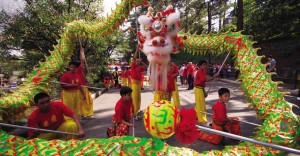Cultural sensitivity to understand China

FILIPINO-CHINESE have been active in fostering cooperation and understanding in Baguio City through the annual Spring Festival and other community projects. RICHARD BALONGLONG
Amid the Philippines’ territorial row with China, are there peaceful ways that all parties can explore to avert a full blown conflict? The answer may yet lie in understanding culture, local and foreign educators say.
A particular major hurdle is language, they say. While many of the world seek to do business and relate with China, the dominant means of communication in professional and business negotiations and diplomacy is still English, says Dr. Peter Kupfer of the Johannes Gutenberg University in Mainz, Germany.
A Chinese language and culture expert, Kupfer spoke in Baguio City in May during a lecture organized by the city government, the Society of Outstanding Citizens of Baguio, and the Baguio Filipino-Chinese Community executive committee.
In the course of relating with China, cultural experts think of some nuances in building goodwill between the emerging economic superpower and its neighbors, which can hardly be articulated because of a communication problem.
Given its lack of capacity to protect its seas, the Philippines always feels “bullied” each time China and other richer neighbors encroach on Philippine waters.
“But who knows, [maybe] what China wants is a joint cooperation with us on how to tap our marine and other resources,” lawyer Carlos Serapio says.
“We laugh at ourselves and say, ‘How can we fight the Chinese when we don’t even have a navy?’” he adds. “Still, we have to focus on our positive strength and values inherited from our founding fathers—from Lapu-Lapu to Jose Rizal, Andres Bonifacio and others.”
One of the leaders of the newly launched Kamalayang Pinoy Movement (KPM), Serapio also spoke in a recent Baguio forum. The movement seeks to “create new conditions for the unfolding of new politics and consciousness” based on universal and Filipino values.
Peace and harmony
While the Philippines seeks to build and assert its national identity and sovereignty, KPM says it must find ways to live peacefully and harmoniously with its neighbors.
“Like it or not, this century is a Chinese century,” says lawyer Edilberto Tenefrancia, who opened the lecture series where Kupfer spoke. “China is so mysterious we still don’t understand her.”
This, he says, despite the Filipinos’ fondness for things Chinese such as “siopao” (steamed buns), “siomai” (dumplings) and “pancit” (noodles).
China itself is concerned that it remains misunderstood by the rest of the world, Kupfer says.
Small wonder during the past nine years, China has embarked on establishing Confucius institutes worldwide. “The enormous project of around 350 Confucius institutes built up within nine years all over the world is a first important step of internalizing Chinese language and culture,” Kupfer says.
Confucius institutes are nonprofit public centers attached with the government of the People’s Republic of China that aim to promote Chinese language and culture, support local Chinese teaching internationally, and facilitate cultural exchanges.
Kupfer, however, cautions that the network of Confucius institutes will only succeed if it doesn’t limit its task to spreading Chinese language and culture “missionary style.”
“Instead, it needs to be used simultaneously as a platform for China to learn about other countries and cultures through various channels, to understand different world-views and
ideologies, to foster mutual
respect and tolerance, and to create preconditions for a peaceful and harmonious global society,” he says.
Culture as complex system
Kupfer is happy that China has stressed on cross-cultural studies and training. More recently, “the Confucius institutes have not limited their activities to the ‘one-way’ mission anymore and gradually refrain from presenting Chinese culture from the narrow-minded ‘aquarium perspective,’” he says.
As China in recent years has aggressively pushed its culture into “going global,” Kupfer says: “Culture cannot be perceived or presented as a
‘container,’ ‘aquarium’ or
‘museum’ like a monolithic, closed, isolated and never changing system.”
“Culture is a highly complex system in permanent transition and exchange with its environment,” he says.
“In history, it always turned out to be hazardous to draw lines between cultures, to emphasize and overestimate one’s own cultural features, to simplify and humiliate others’ cultures, to deny the similarities of cultures and focus on their differences,” Kupfer adds.
He cites the general tendency to draw lines between “East
versus West” or “Europe versus Asia.”
“The fundamental difference between culture and economics is that culture is growing in a natural way and cannot be created, developed and controlled according to plan,” he says.
“Culture is ‘soft power’ and has its own evolution rules, it cannot function as ‘export product,’ it cannot be commercialized and merchandized, it cannot be consumed like fast food and be submitted to business competition,” he says.
China’s traditional culture, he says, cannot just be reduced to symbols like the Great Wall, wushu, lion’s and dragon’s dances, the panda, Chinese opera and tea ceremony, among others.
“China’s culture going global is a long-term, step-by-step process, which has to be explored and implemented deliberately,” he says.
And the only way of a culture becoming attractive, he says, is that it promotes and expands “cross-cultural dialogue, equal exchange of ideas and sincere mutual understanding.”
As a policy, China now recognizes that its crucial task will be to reduce 80 percent of the world populations’ “prevalent misunderstandings, prejudices and stereotypes about Chinese culture and society, and to present China as a multiethnic, multilinguistic, multireligious socially and culturally diversified nation,” he says.